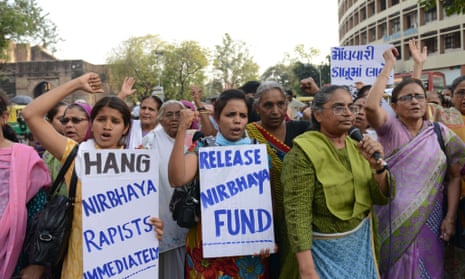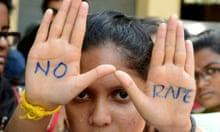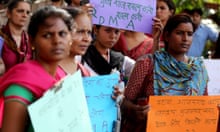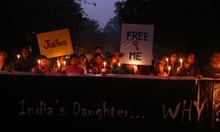A young activist who defied the Indian government’s ban on the documentary India’s Daughter and screened the film for a village audience near the northern city of Agra has been apprehended by police.
Ketan Dixit was quoted on Monday as saying he was ready to “face any action that was initiated” after showing the documentary on Sunday on a makeshift screen made of white bedsheets in the compound of a journalist’s family home in Roopdhanu, around 30km from the Taj Mahal.
Around 60 men, women and children watched the film, which has been the subject of furious controversy since the Indian authorities’ decision to pull it from the air last week. The film, by British documentary-maker Leslee Udwin, is about the fatal gang rape of a young woman in Delhi in December 2012.
“This is the beginning of a series of protests,” Dixit told a reporter. “We will also lodge a protest petition online against this ban.” Police also confiscated all the audiovisual equipment used for the unofficial screening on International Women’s Day.
Dixit, who previously worked for a Hindi newspaper and shot documentaries while at journalism college, had borrowed the equipment from a cafe in Agra set up by the Stop Acid Attacks (SAA) campaign.
Dixit is a volunteer with the campaign but SAA clarified that, although it supported his protest, the film screening was his “individual initiative”. He had previously raised the issue with both the Indian prime minister, Narendra Modi, and home minister, Rajnath Singh, on Twitter, thanking the BBC for showing the documentary and announcing: “Now I am taking film to villages.”
On Sunday night a news channel in India banned by the government from showing India’s Daughter responded with a powerful hour-long on-air protest in the slot in which it had intended to broadcast it.
After Dixit’s screening in Roopdhanu, meanwhile, 18-year-old Deeksha said she felt the film had managed to portray the mindset of many in society. “Every woman should see it,” she told a Times of India reporter. “The government should revoke the ban immediately.”
“I think the rapists should simply be hanged,” another woman, Meera Parmar, was quoted as saying.
SAA, a group campaigning on behalf of young women disfigured by acid-throwing men, expressed concern that, following the screening, the police might implement a general crackdown against social activists.
“Since Ketan screened this documentary, police are pressuring everyone who is associated with him,” it said. It appealed for support from civil society.







